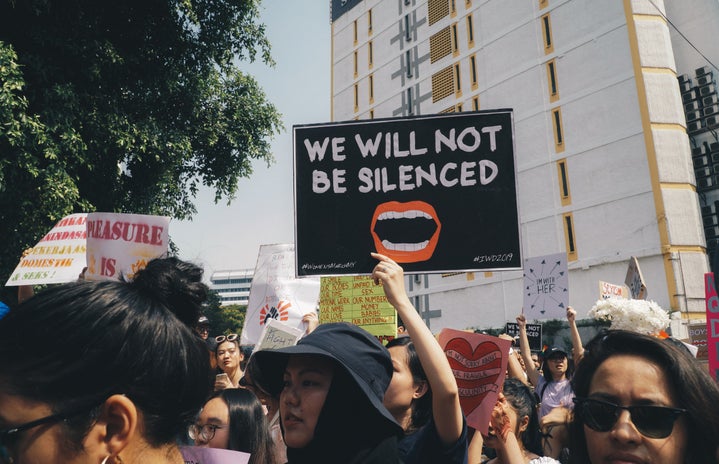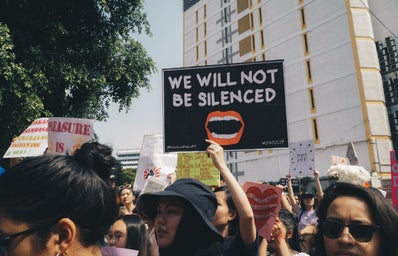On March 16th 2021, a series of mass shootings targeting Asian spa’s took place in Atlanta, Georgia. As a result, 8 people were left dead, 6 of whom were Asian women. Young’s Asian Massage, the first targeted establishment, saw Delaina Ashley Yaun, Paul Andre Michels, Xiaojie Tan, and Daoyou Feng lose their lives. The suspects’ second and third attacks in central Atlanta took the lives of Soon Chung Park, Hyun Jung Grant, Suncha Kim, and Yong Ae Yue [1]. Unsurprisingly, the perpetrator- 21 year old Robert Aaron Long – is a religious white male. Even more unsurprising in the wake of these deaths is the handling of his arrest, keeping in line with the police’s nonviolent and even accommodating actions towards white male murderers.
Later that evening the suspect was safely located and detained without violence, despite being in the midst of an ongoing rampage to murder more Asian women. Robert Aaron Long was en route to Florida to target another spa when he was arrested, only being identified after his own parents turned him in to the police [2]. Long insisted these crimes were not racially motivated but due to a sex addiction that caused him to frequent these targeted locations. At a press conference later that day Captain Jay Baker, the Sheriff’s official spokesman, refused to call the murders a hate crime, instead choosing to offer up the suspects explanation for his actions. Rather than call out the racially motivated and misogynistic murders for what they are, officials offered a defensive explanation for this man’s murderous rampage: ‘He was pretty fed up and kind of at the end of his rope and yesterday was a really bad day for him…and this is what he did’ [3].
In the eyes of the American justice system, being ‘pretty fed up’ and having a ‘really bad day’ is a reasonable explanation for mass murder as long as you’re a straight white male. This kind of treatment, essential for upholding the system, is reminiscent of the police’s treatment of Dylan Roof in 2015. After targeting Black churches and assassinating African Americans in peaceful worship, the white supremacist suspect was not only arrested without harm but was in fact bought a Burger King en route to the police station [4]. The police’s treatment of Roof is indicative of the disparaging difference in the value we as a society place on human lives; the police’s actions in these situations is as much a clear dismissal of African American and Asian lives as it is a protection of whiteness.
This systematic xenophobia couldn’t be more clear in light of the recent Atlanta shootings. Captain Jay Baker, who after speaking with the suspect made defensive and excusatory comments on behalf of him, has since been found to have promoted anti-Asian racism online. It was revealed on Twitter that the officer purchased a t-shirt in the height of the global pandemic reading ‘Covid-19 Imported Virus From Chy-Na’. Captain Baker also encouraged others to purchase t-shirts with the same xenophobic slogan, writing ‘love my shirt! Get yours while they last’. This kind of behaviour from high up officials in the police force is disappointing but hardly surprising in current times, with calls to defund the police due to systematic racism at an all time high. However, this also speaks to the wider increase of anti-Asian racism since the beginning of the pandemic, which has led to an increase in racial slurs and hate crimes against Asians all over the world.
Unfortunately, this is exactly the kind of anti-Asian racism and xenophobia that has been spreading like wildfire since the start of the pandemic. Bringing an often ‘swept under the rug’ race issue more visibly into the public sphere, Coronavirus has exposed just how virulent anti-Asian racism is in our society. With Donald Trump publicly and repeatedly calling the virus the ‘China Virus’, once again stoking the fires of racism and xenophobia in the US, the increase in anti-Asian hate crimes since the start of the pandemic comes as no surprise. NBC recently revealed that there were 3,800 reported hate incidents against Asians in the US, a considerable increase from the previous year [5]. Significantly, 68% of these hate crimes were committed against women, revealing an intersection of racism and sexism that leaves Asian women especially vulnerable.
It’s worth noting that this report only accounts for the number of reported attacks; the actual number of hate crimes will be significantly higher. Since the attacks on Monday, members of the Asian community have been speaking out about their experiences with racism. Former MTV correspondent Suchin Pack shared a post detailing her legal battle over racist sexual harassment at work. Suchin was the subject of racist and derogatory sexual comments by a white male colleague, who told a room full of other employees Suchin looked like a ‘’me sucky sucky love you longtime’ whore’ [6]. This abuse speaks to the derogatory fetishisation of Asian women in the porn industry and in wider popular culture that gives the green flag for white men to debase and degrade Asian women. Suchin fought this racism at the time and bravely shared her story after the attacks on Monday; the attacks that showed us just how violent the consequences of reducing Asian women to nothing more than a kink or sexual fantasy can be.
After his arrest, Robert Aaron Long claimed his targets were not racially motivated but an attack on places he felt were temptations for his sexual addiction. Cherokee Country officials disclosed that the suspect often frequented these locations, claiming ‘there was a temptation for him he wanted to eliminate’ [7]. The suspects’ racially-motivated murder spree, rooted in his sexual fetishisation of Asian women, shows us just how violent these racially charged sexual representations of Asian women are. The language used in the reports frames the targets of Long’s shooting as the ‘locations’ which were deemed ‘sites of temptation’. This is misleading rhetoric. The targets of Long’s shooting spree were not massage parlours, they were the Asian women who worked there, who due to Long’s racially derogatory fetishisation of them were deemed ‘sites of temptation’.
These hate crimes do not happen in a vacuum. They are not isolated incidents stemming from a singular individual’s insanity; as helpful as it is to the upholding of white patriarchal dominance to paint them as such. They are representative of the tapestry of our society and how each fetishised sexual representation of an Asian woman contributes to racial bigotry and violence. These senseless murders do not exist without our compliance in a system which functions on the debasement of non-white women through the upholding of racial stereotypes. It’s time we stop sweeping anti-Asian racism under the rug and start calling out the fetishisation and exoticization of Asian women for the violence, racism and misogyny that it is.



